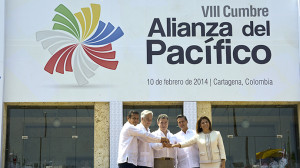Four Latin American Countries Agree $85 bn Free-Trade Deal
LATIN AMERICA AND THE CARIBBEAN, 17 Feb 2014
Russia Today – TRANSCEND Media Service

Family photo of presidents (L to R): Peru’s Ollanta Humala, Chile’s Sebastian Pinera, Colombia’s Juan Manuel Santos, Mexico’s Enrique Pena Nieto and Costa Rica’s Laura Chinchilla at the convention center in Cartagena, Colombia on February 10, 2014.
(AFP Photo / Luis Acosta)
Chile, Colombia, Peru and Mexico have signed a treaty to eliminate tariffs on 92 percent of goods and services. The Pacific Alliance is free trade area of some 210 million people, accounting for more than a third of all Latin American and Caribbean GDP.
The move is a big step towards strengthening the countries’ position alongside the strong neighboring trade pact – Mercosur – which includes Argentina, Brazil, Paraguay, Uruguay and Venezuela.
“This translates into more investment, more competitiveness and as a consequence, more employment, and good quality employment. This is the fundamental purpose of this whole exercise,” the Wall Street Journal quotes Colombia’s President Juan Manuel Santos.
Morgan Stanley estimates an average 4.25 percent growth for the new alliance this year, or about $85 billion. At the same time many economists forecast a shrinking Venezuelan economy, weak 2 percent growth for Brazil, along with Argentina falling into recession.
Besides establishing strong economic connections, the deal will also create a fund to finance infrastructure investment and a medicines price monitoring and leverage system.
The Pacific Alliance, founded in June 2012, has set a vital goal to increase trade with fast-growing Asian nations. Accounting for 50 percent of the population of Latin America the union is ready for further expansion. Costa Rica applied for membership at the VIII Summit of the Pacific Alliance. Panama and Guatemala have also expressed interest in becoming members.
DISCLAIMER: The statements, views and opinions expressed in pieces republished here are solely those of the authors and do not necessarily represent those of TMS. In accordance with title 17 U.S.C. section 107, this material is distributed without profit to those who have expressed a prior interest in receiving the included information for research and educational purposes. TMS has no affiliation whatsoever with the originator of this article nor is TMS endorsed or sponsored by the originator. “GO TO ORIGINAL” links are provided as a convenience to our readers and allow for verification of authenticity. However, as originating pages are often updated by their originating host sites, the versions posted may not match the versions our readers view when clicking the “GO TO ORIGINAL” links. This site contains copyrighted material the use of which has not always been specifically authorized by the copyright owner. We are making such material available in our efforts to advance understanding of environmental, political, human rights, economic, democracy, scientific, and social justice issues, etc. We believe this constitutes a ‘fair use’ of any such copyrighted material as provided for in section 107 of the US Copyright Law. In accordance with Title 17 U.S.C. Section 107, the material on this site is distributed without profit to those who have expressed a prior interest in receiving the included information for research and educational purposes. For more information go to: http://www.law.cornell.edu/uscode/17/107.shtml. If you wish to use copyrighted material from this site for purposes of your own that go beyond ‘fair use’, you must obtain permission from the copyright owner.
Read more
Click here to go to the current weekly digest or pick another article:
LATIN AMERICA AND THE CARIBBEAN: